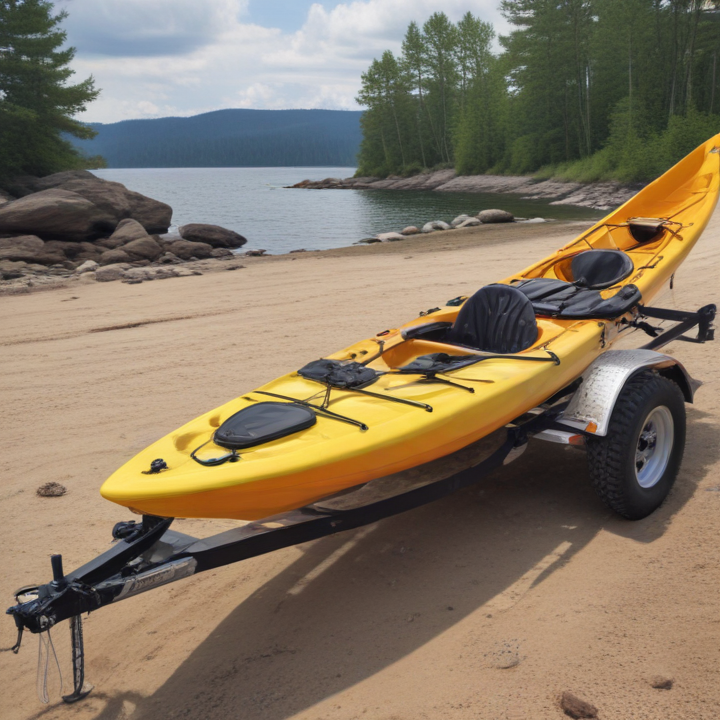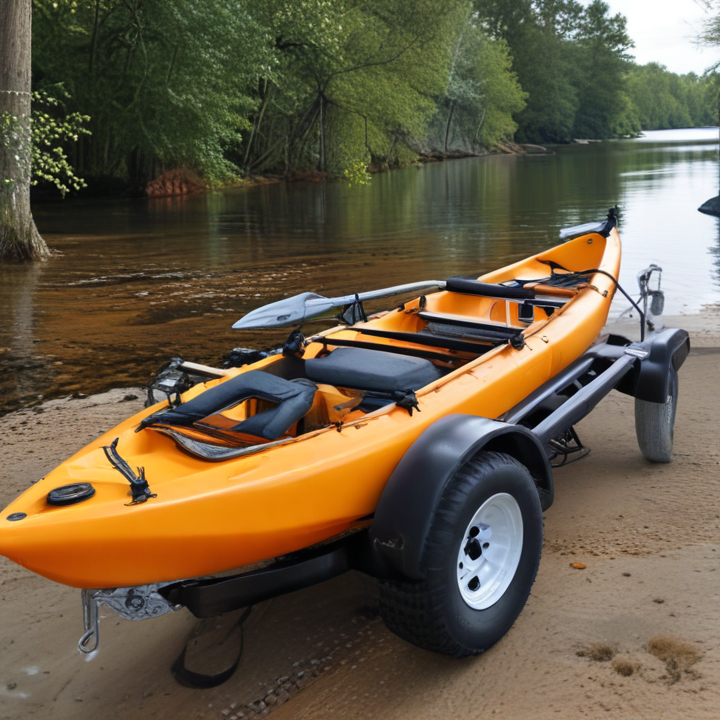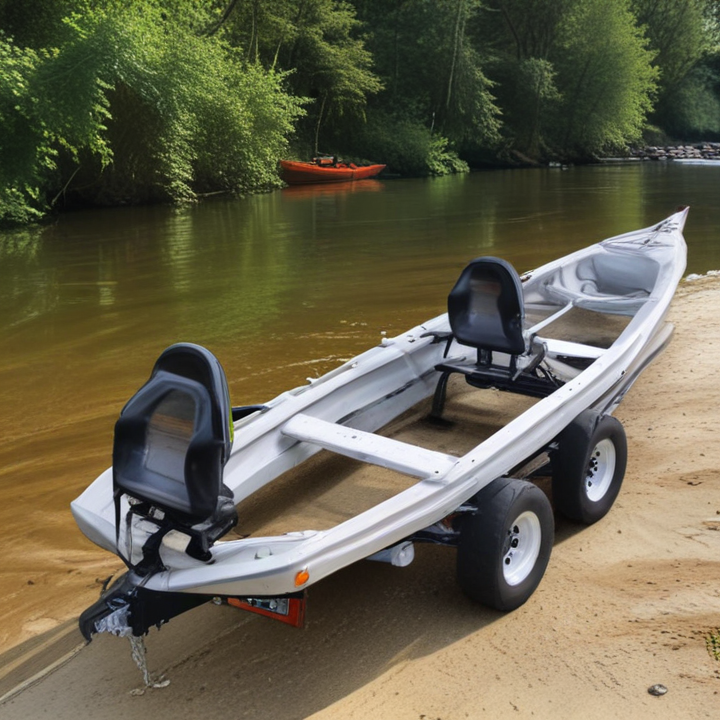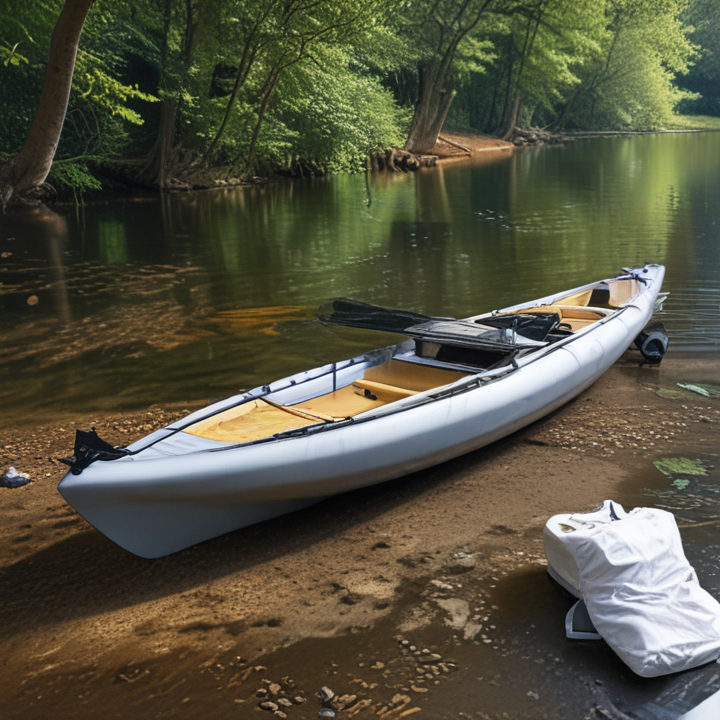kayak trailer Safety Certifications
When considering a kayak trailer, safety certifications are crucial to ensure that the trailer meets industry standards and provides a secure and reliable means of transporting your kayak. Here are some key safety certifications and standards to look for:
1. National Highway Traffic Safety Administration (NHTSA): In the United States, the NHTSA sets regulations for trailers, including those used for kayaks. Ensure the trailer complies with NHTSA standards for lighting, reflectors, and overall construction.
2. Society of Automotive Engineers (SAE): SAE standards cover various aspects of trailer design and safety, including hitch systems, braking systems, and structural integrity. Look for trailers that adhere to SAE guidelines.
3. European Union (EU) Type Approval: For trailers sold in Europe, the EU Type Approval ensures that the trailer meets specific safety and environmental standards. This certification covers aspects such as braking systems, lighting, and overall construction.
4. ISO Standards: The International Organization for Standardization (ISO) provides guidelines for quality management and safety. ISO 9001 certification indicates that the manufacturer follows stringent quality control processes.
5. Australian Design Rules (ADR): In Australia, ADRs are national standards for vehicle safety, including trailers. Ensure the kayak trailer complies with relevant ADRs for construction, lighting, and braking systems.
6. Canadian Motor Vehicle Safety Standards (CMVSS): In Canada, CMVSS regulations apply to trailers. Look for trailers that meet these standards for safety features such as lighting, reflectors, and structural integrity.
When purchasing a kayak trailer, always check for these certifications to ensure it meets the necessary safety standards. Additionally, consider factors such as load capacity, material quality, and ease of use to ensure a safe and reliable transportation solution for your kayak.
List Reference Technical Parameters of “kayak trailer”
When considering a kayak trailer, several technical parameters are essential to ensure it meets your needs. Here are some key reference technical parameters:
1. Load Capacity: The maximum weight the trailer can carry, typically measured in pounds or kilograms. Ensure it can handle the weight of your kayak(s) and any additional gear.
2. Trailer Weight: The weight of the trailer itself, which affects towing requirements and fuel efficiency.
3. Dimensions: Overall length, width, and height of the trailer. These dimensions determine the trailer’s compatibility with your vehicle and storage space.
4. Material: Common materials include steel and aluminum. Steel is durable but heavier, while aluminum is lighter and resistant to rust.
5. Number of Kayaks: The maximum number of kayaks the trailer can hold. Some trailers are designed for a single kayak, while others can carry multiple.
6. Tire Size: The size of the tires, which affects the trailer’s stability and ability to handle different terrains.
7. Suspension: The type of suspension system, which impacts the smoothness of the ride and the protection of your kayak(s).
8. Hitch Compatibility: The type of hitch required to attach the trailer to your vehicle, typically specified as a class (e.g., Class I, II, III).
9. Braking System: Whether the trailer has its own braking system, which is crucial for safety, especially with heavier loads.
10. Lighting and Wiring: Compliance with road safety regulations, including brake lights, turn signals, and wiring harness compatibility.
11. Adjustability: Features that allow for adjustments to accommodate different kayak sizes and shapes.
12. Storage Features: Additional storage options for paddles, life vests, and other gear.
13. Assembly Requirements: Whether the trailer comes pre-assembled or requires assembly, and the complexity of the assembly process.
14. Foldability: Some trailers can be folded for easier storage when not in use.
These parameters help ensure that the kayak trailer you choose is suitable for your specific needs and provides a safe and efficient means of transporting your kayak(s).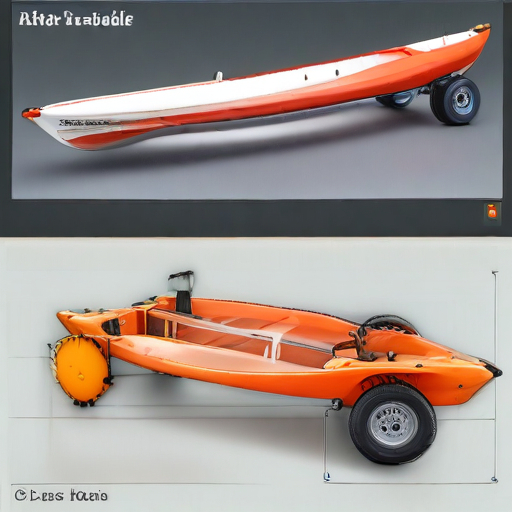
List Product features of “kayak trailer”
1. Durabilidad y Construcción: Hechos de materiales resistentes como acero galvanizado o aluminio, los remolques para kayak están diseñados para soportar las condiciones climáticas y el peso de múltiples kayaks.
2. Capacidad de Carga: Pueden transportar desde uno hasta varios kayaks, dependiendo del modelo. Algunos incluyen estantes ajustables para acomodar diferentes tamaños y tipos de kayaks.
3. Facilidad de Montaje y Desmontaje: Muchos remolques vienen con sistemas de ensamblaje rápido y sencillo, permitiendo una configuración fácil y eficiente.
4. Diseño Compacto: Algunos modelos son plegables o desmontables, permitiendo un almacenamiento compacto cuando no están en uso.
5. Suspensión y Neumáticos: Equipados con sistemas de suspensión de alta calidad y neumáticos duraderos, estos remolques garantizan un viaje suave y seguro, incluso en terrenos irregulares.
6. Seguridad: Incluyen características de seguridad como luces LED, reflectores, y sistemas de amarre para asegurar los kayaks durante el transporte.
7. Accesorios Adicionales: Pueden venir con accesorios como soportes para remos, cajas de almacenamiento, y cubiertas protectoras.
8. Compatibilidad: Diseñados para ser compatibles con la mayoría de los vehículos de remolque estándar, con enganches ajustables y sistemas de freno integrados en algunos modelos.
9. Facilidad de Carga y Descarga: Incluyen rampas o sistemas de rodillos para facilitar la carga y descarga de los kayaks sin necesidad de levantar mucho peso.
10. Protección del Kayak: Almohadillas y soportes acolchados para evitar daños a los kayaks durante el transporte.
11. Versatilidad: Algunos modelos pueden adaptarse para transportar otros equipos acuáticos como tablas de paddle o canoas.
Cada uno de estos atributos está diseñado para mejorar la experiencia de transporte, asegurando que los kayaks lleguen a su destino de manera segura y eficiente.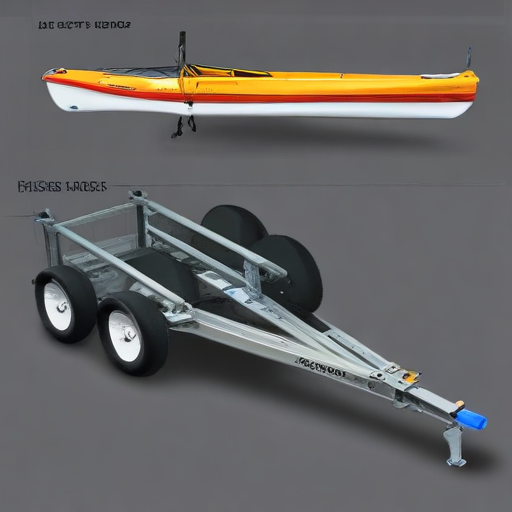
“kayak trailer” Warranty and Support
When purchasing a kayak trailer, it is essential to check the manufacturer’s warranty and support details to ensure you are covered in case of defects or issues. Typically, warranties for kayak trailers can range from one year to a limited lifetime warranty. Here are the key points you should consider:
1. Warranty Duration:
– One Year: Basic coverage, typically against manufacturing defects.
– Extended Warranty: Some manufacturers offer extended warranties that might cover specific components like the frame or axles for longer periods.
– Limited Lifetime: Coverage that extends for the lifetime of the product, often limited to the original purchaser and excluding normal wear and tear.
2. Coverage:
– Material and Workmanship: Defective materials and poor workmanship are usually covered.
– Exclusions: Damage due to abuse, overloading, modifications, and normal wear and tear are often excluded.
– Components: Check if the warranty covers just the frame or includes other components like wheels, lights, or hitches.
3. Support:
– Customer Service: Availability of customer service for troubleshooting and queries. Look for manufacturers with good reputations for customer support.
– Repair and Replacement: Policies on repair or replacement of defective parts. Determine if the service is performed by the manufacturer or authorized centers.
– Documentation: Ensure you receive all necessary documentation, including a warranty certificate and user manual.
4. Claims Process:
– Procedure: Understand the claims process, which typically involves contacting customer service, providing proof of purchase, and possibly sending photos or the defective part.
– Response Time: Check the average response time for warranty claims and repairs or replacements.
Before finalizing your purchase, read the warranty terms carefully and consider contacting the customer support of the manufacturer if you have any specific questions or situations you need clarified.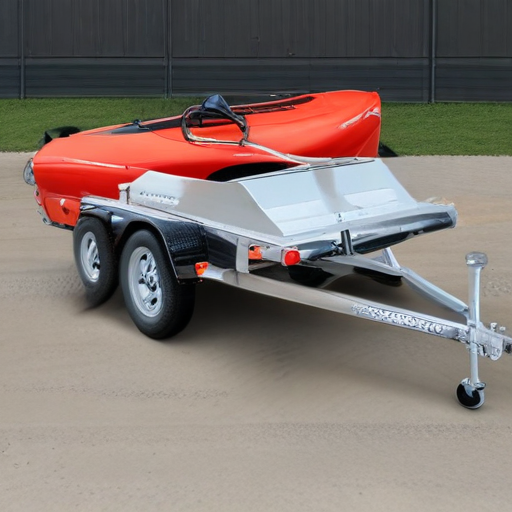
List “kayak trailer” FAQ
Certainly! Here’s a list of frequently asked questions (FAQ) about kayak trailers:
Kayak Trailer FAQ
#### 1. What is a kayak trailer?
A kayak trailer is a specialized trailer designed to transport kayaks. It typically has racks or cradles to securely hold the kayaks during transportation.
#### 2. How many kayaks can a trailer carry?
Kayak trailers come in various sizes and designs, allowing them to carry anywhere from one to multiple kayaks. Some larger trailers can carry up to eight or more kayaks.
#### 3. Do I need a special license to tow a kayak trailer?
In most regions, a regular driver’s license is sufficient to tow a kayak trailer. However, it’s essential to check local regulations as they can vary.
#### 4. What should I look for when buying a kayak trailer?
Consider the following factors:
– Capacity: The number of kayaks you need to transport.
– Weight Limit: Ensure the trailer can handle the weight of your kayaks.
– Material: Look for durable materials like galvanized steel or aluminum.
– Ease of Use: Features like easy loading/unloading and adjustable racks.
– Storage: Some trailers can be folded or disassembled for storage.
#### 5. How do I secure my kayak to the trailer?
Use straps or tie-downs to secure the kayak to the trailer. Ensure the kayak is snug and won’t move during transportation. Some trailers come with built-in straps or cradles for added security.
#### 6. Can I use a kayak trailer for other purposes?
Yes, many kayak trailers are versatile and can be used to transport other items like canoes, paddleboards, or even small boats. Check the weight and size limits before using it for other purposes.
#### 7. How do I maintain my kayak trailer?
Regular maintenance includes:
– Inspection: Check for any wear and tear, especially on the tires and straps.
– Cleaning: Rinse off saltwater and debris after each use.
– Lubrication: Keep moving parts like hinges and wheels lubricated.
– Storage: Store the trailer in a dry place to prevent rust and damage.
#### 8. Are there any safety tips for towing a kayak trailer?
– Check Connections: Ensure the trailer hitch and connections are secure.
– Weight Distribution: Balance the load evenly to prevent swaying.
– Speed Limits: Adhere to speed limits and drive cautiously.
– Lights and Signals: Ensure all trailer lights and signals are working correctly.
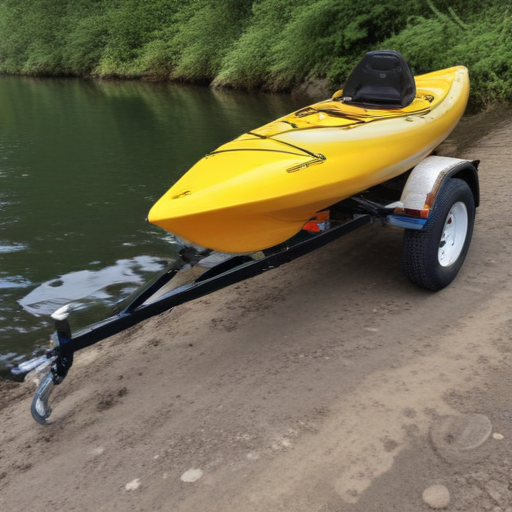
Top 10 FAQ with answer about kayak trailer for Buyer Sourcing from China
Top 10 FAQs About Sourcing Kayak Trailers from China
1. What are the key factors to consider when sourcing kayak trailers from China?
– Consider the manufacturer’s reputation, product quality, compliance with international standards, pricing, and logistics support. Verify their export experience and check for certifications like ISO or CE.
2. How can I ensure the quality of kayak trailers from Chinese suppliers?
– Request product samples, perform factory audits, and ask for quality control reports. Utilize third-party inspection services to verify product quality before shipment.
3. What are the common materials used in manufacturing kayak trailers?
– Most kayak trailers are made from galvanized steel, aluminum, or a combination of both for durability and corrosion resistance. Ensure materials meet your required specifications.
4. What is the typical lead time for production and delivery?
– Lead times can vary but typically range from 30 to 60 days for production, plus additional shipping time depending on the destination. Confirm specific timelines with the supplier.
5. Are customization options available for kayak trailers?
– Yes, many Chinese manufacturers offer customization options for design, size, color, and branding to meet specific requirements. Discuss customization needs upfront.
6. What are the payment terms commonly accepted by Chinese suppliers?
– Common payment terms include 30% deposit upfront and 70% balance before shipment. Methods such as T/T (telegraphic transfer) and L/C (letter of credit) are widely used.
7. How do I handle shipping and logistics for kayak trailers from China?
– Choose between FOB (Free on Board) or CIF (Cost, Insurance, and Freight) terms. Work with a reliable freight forwarder to manage shipping, customs clearance, and delivery.
8. What is the minimum order quantity (MOQ) for kayak trailers?
– MOQs vary by supplier but typically range from 10 to 50 units. Negotiate with suppliers to find a suitable MOQ based on your business needs.
9. Are there any import duties or taxes on kayak trailers?
– Yes, import duties and taxes vary by country. Consult with a customs broker or refer to your country’s import regulations to determine applicable charges.
10. How can I verify the legitimacy of a Chinese supplier?
– Verify the supplier’s business license, check reviews and references, and use platforms like Alibaba’s Trade Assurance or Global Sources to ensure reliability. Conduct due diligence through background checks and on-site visits if possible.

